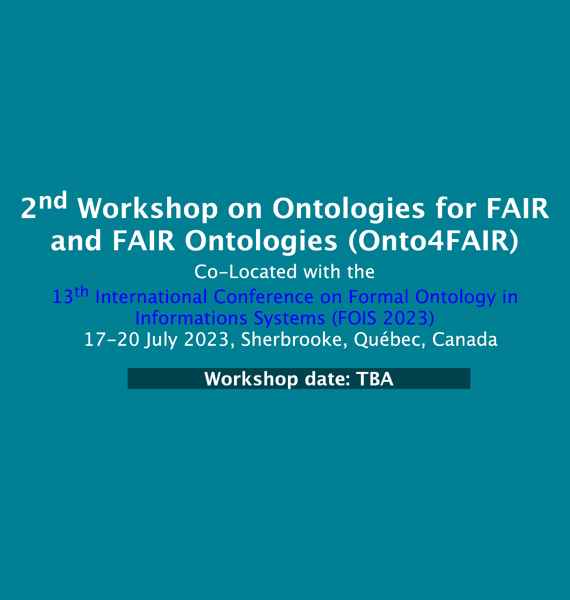Workshop on Ontologies for FAIR and FAIR Ontologies (Onto4FAIR)
Home | Events | Researchers | Workshop on Ontologies for FAIR and FAIR Ontologies (Onto4FAIR)

Sherbrooke, Canada, 17–20 July 2023.
One the one hand, a key aspect is the ability of properly and semantically describing resources, in particular with the help of ontologies. On the other hand, ontologies themselves have to be compliant with the FAIR principles.
The Onto4FAIR workshop has the following goals:
- to bring together leaders from academia, industry and user institutions to discuss the adoption of FAIR principles in research and real-world requirements
- to serve to inform about existing research efforts that may meet their requirements.
- to investigate how the FAIR principles are supported by the use of ontologies that ideally are themselves FAIR.
- to discuss the challenges and perspectives in adopting FAIR principles.
Topics of Interest
The topics of interest include, but are not limited to, the following:
- schemas, ontologies and vocabulaires for FAIR data and metadata;
- domain and cross-domain ontologies for FAIR data;
- approaches to make vocabularies and ontologies FAIR(er);
- alignment of schemas, vocabulaires and ontologies for FAIR;
- FAIR data management and stewardship;
- best practices for implementing the FAIR principles;
- FAIRification process and use cases;
- metrics for FAIRness assessment;
- provenance in FAIR environments;
- FAIR principles and open science;
- FAIR principles and Linked (Open) Data;
- FAIR in industry, scientific communities (life science, digital humanities, health, smart cities, etc.).
Programme
TBA
Important dates
- Workshop paper submission: May 24, 2023
- Author notification: June 30, 2023
- Camera-ready version: June 30, 2023 (strict)
- Workshop: July 17-19, 2023
Submission guidelines
- Regular papers: 10-14 pages (including references)
- Short papers: 5-9 pages (including references)
Submissions must be in PDF, formatted in CEUR-ART, 1-column style conference proceedings. A Overleaf template is available. We strongly encourage authors to use Latex.
Please submit your contribution on EasyChair at the following link: https://easychair.org/conferences/?conf=fois2023. Papers have to be submitted to the track Workshop on FAIR Ontologies and Ontologies for FAIR.
The proceedings will be made available through CEUR within the IAOA’s series.